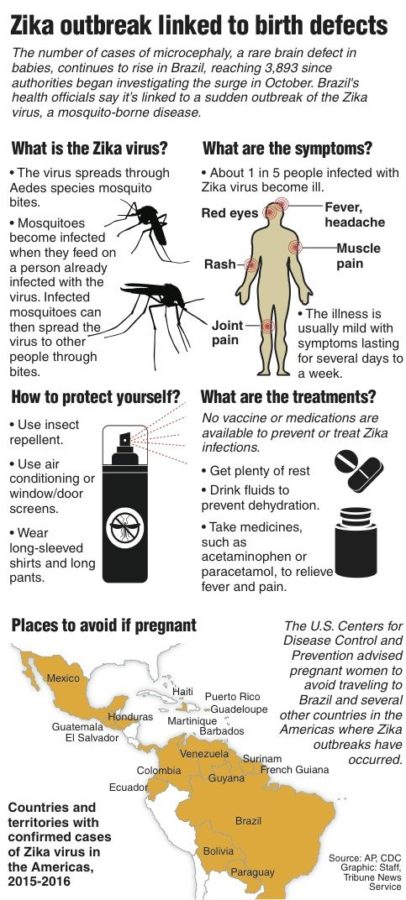Rapid spread of Zika virus has WHO considering global health emergency
January 28, 2016
The fast spread of the Zika virus in the Americas has prompted the World Health Organization to discuss whether the outbreak constitutes a global health emergency, WHO chief Margaret Chan said Thursday in Geneva.
“The level of alarm is extremely high,” Chan told WHO member state representatives meeting in Geneva, noting that the virus was spreading “explosively” through mosquitoes in the region.
A panel of WHO-appointed experts is to meet Monday to advise Chan whether the situation should be classified as a so-called public health emergency of international concern, as was the case with Ebola.
Advertisement
There are estimates that there may have been 1.5 million Zika cases in this year’s Olympic host country Brazil, where the outbreak started last year, senior WHO officials said.
The number of cases in the Americas could grow to 3 million to 4 million within 12 months, they said.
Some 4,000 babies had been born with unusually small heads amid the outbreak, Brazilian Health Ministry official Claudio Maierovitch said via video link to Geneva. In addition, there has been a spike in reported cases of Guillain-Barre muscle weakness syndrome.
Chan emphasized that more research was needed to establish what connections, if any, there are between Zika and these health problems.
In most patients, the Zika virus causes only mild symptoms including fever and rashes.
“It is not Ebola,” said Marcos Espinal, WHO’s leading communicable disease official in the Americas.
At the same time, Chan said WHO was not only concerned about birth defects and neurological syndromes, but about the risk of further international spread. Most people lack immunity and there is currently no vaccine or rapid diagnostic method.
Advertisement*
This year’s El Nino weather patterns, which result from a warming of Pacific Ocean temperatures that occurs every few years, are “expected to increase mosquito populations greatly in many areas,” Chan said.
The disease has so far reached 24 countries and territories in the Americas.
WHO and the U.S. Centers for Disease Control and Prevention has recommended pregnant women avoid mosquito bites and consult doctors before planning trips to countries where the virus is circulating.
U.S. officials said Zika outbreaks in the United States are possible, however because U.S. urban areas are not densely populated, are well air-conditioned and are generally healthier living conditions, the outbreak should not be as severe as in other places.
According to U.S. officials, there have been 31 travel-associated cases in 11 states. There have been 20 lab-confirmed cases in U.S. territories: one in Puerto Rico and 19 in the Virgin Islands.
WHO official Espinal said the main tasks now were to strengthen health systems in affected countries, step up mosquito control and speed up research on the disease.
___
(c)2016 Deutsche Presse-Agentur GmbH (Hamburg, Germany)
Visit Deutsche Presse-Agentur GmbH (Hamburg, Germany) at www.dpa.de/English.82.0.html
Distributed by Tribune Content Agency, LLC.
Advertisement









